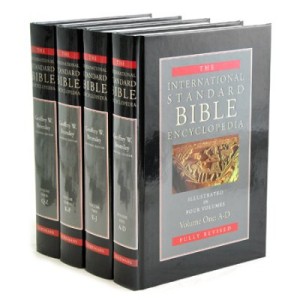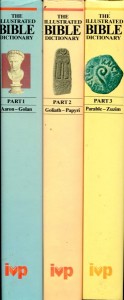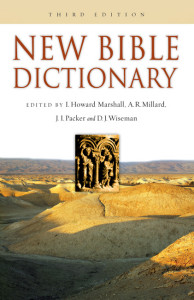In olden days a Bible dictionary confined its range to subjects mentioned in the Bible whereas a Bible encyclopaedia went further around the subject. So, for example, we would expect to find articles on the Caesars Augustus, Tiberius, and Claudius because they are named in the New Testament (use a concordance to find them!) whereas a Bible encyclopaedia would go further and have something on other Roman emperors who are not explicitly named in Scripture but were nevertheless there in the background. However this distinction is no longer rigidly maintained and Bible dictionaries and encyclopaedias are increasingly coming to resemble one another.
Recommended examples include:
 Bromiley, Geoffrey W., ed., International Standard Bible Encyclopedia (Grand Rapids MI: Eerdmans, 1979-1988).
Bromiley, Geoffrey W., ed., International Standard Bible Encyclopedia (Grand Rapids MI: Eerdmans, 1979-1988).
The first edition of this classic was published in 1915 and revised in 1929. Be aware that the 1929 edition is so highly regarded by some that it is still in print and sometimes at a lower price than the most recent edition. Some of the older theological articles were first class and still worth reading but much of the other material (archaeology, for one obvious example) is now too outdated to be a first choice. The four volumes are:
Volume One: A – D
Volume Two: F – J
Volume Three: K – P
Volume Four: Q – Z.
 Douglas, J. D., and N. Hillyer, eds, The Illustrated Bible Dictionary (Leicester: InterVarsity Press, 1986).
Douglas, J. D., and N. Hillyer, eds, The Illustrated Bible Dictionary (Leicester: InterVarsity Press, 1986).
The first edition was printed on good quality paper and is preferable to subsequent, cheaper editions. It has been out of print for some time but can be found second-hand. To help you search here are the titles of the three volumes:
Part One: Aaron – Golan
Part Two: Goliath – Papyri
Part Three: Parable – Zuzim.
Note that there are several other “Illustrated Bible Dictionaries” in existence so if you are buying sight unseen, double check which you are getting!
 Marshall, I. Howard, A. R. Millard, and J. I. Packer, eds, The New Bible Dictionary (Leicester: InterVarsity Press, 1996).
Marshall, I. Howard, A. R. Millard, and J. I. Packer, eds, The New Bible Dictionary (Leicester: InterVarsity Press, 1996).
This is the third “New” Bible Dictionary and probably the best to buy although the earlier editions have merit. If you invest in IVP’s Essential CD-ROM the NBD is part of the package.
Changing habits
Over recent years the way many of us use reference books has changed. If I cannot remember whether Thingummy was the father or son of Whatsisname, or how many Ls there should be in Maher-shalal-hash-baz, or how many miles there are to Babylon I no longer turn to my trusty Bible dictionary and, I suspect, neither will you. Instead I use my electronic Study Bible or preferred search engine and click for the answer rather than turn pages. Publishers have noticed this trend and have moved much of their reference material into newer formats (e-books, CD-ROMs, etc.) or started to redefine what reference books are and how they should work. Thus newer dictionaries tend to have fewer but longer articles and focus on specific subject areas so, using my own library as an example, I have dictionaries of Christian Apologetics, The Christian Church, The Classical World, Mythology, Philosophy, Religious Education, and so forth as well as subject-specific Bible dictionaries including Jesus and the Gospels, Paul and His Letters, and more. However none of these would count as recommended purchases for Introduction to Bible Study. If you are interested in a specific subject area and would like some advice please get in touch.
See “Big Black Dictionaries” in BiBloS Issue 3 (May 2016) here.
